The Nicene Creed
By : Reformed Free Publishing Association
Dordt’s aftermath: Did orthodoxy win the battle but lose the war?
By : Reformed Free Publishing Association
Sometimes an army has won a major battle during a war, but lost the war in the end. The Synod of Dordt marked a decisive victory for Reformed orthodoxy and a blow to Arminianism. But Dordt’s victory appears to have been short-lived. Did Reformed orthodoxy win the battle at Dordt, only to lose the war? In answering that question, this article surveys the history of the Remonstrants and of Arminianism after the Synod of Dordt.
Read More
The Church Prayer Meeting
By : Reformed Free Publishing Association
Church prayer meetings are not commonly held in our Protestant Reformed Churches, in fact they are not very common as far as we know in any of the Reformed Churches. They have long been a tradition in Presbyterian Churches as well as a number of other churches. There are those who claim that they were regularly held in the church from the time of the apostles. We have had the opportunity to experience such meetings during our labors as missionaries in the Evangelical Reformed Church of Singapore. These prayer meetings were already an institution in what was then the Gospel Literature and Tract Society (G.L.T.S.) when we came to Singapore. We found these prayer meetings to be a great source of blessing both to the church as a whole and to ourselves personally. It is our purpose in this article to tell you something about these meetings. We want also to consider some of the biblical bases for holding such meetings. Finally, we want to relate some of what we can see to be the great blessings these meetings afford the church. It is our conviction that we as Protestant Reformed Churches can learn from these meetings and that we could well consider holding similar meetings in our own midst.
Read MoreEphesians—The Church, One in Christ
By : Reformed Free Publishing Association
The epistle to the Ephesians sets forth the grand theme of the church's unity in Christ. Being one of Paul's writings during his confinement in Rome, it reflects the maturity and spiritual insight of one whom the Holy Spirit had prepared for such a task.
Read MoreApril 15, 2019 Standard Bearer preview article
By : Reformed Free Publishing Association
Having set before us the folly and disorder of affairs in civil life, the Word of God turns to a series of natural or organic connections. The intent is that we should contemplate them, discern the reality of things, and by that reflection point us to the way of wisdom and warn us against folly. We need, therefore, to consider the illustrations in their natural context first.
Read More
The Strength of Youth: Asset or Liability?
By : Reformed Free Publishing Association
A word of explanation concerning the title of this article is first in order. All the articles in this section of the Standard Bearer are under the theme "The Strength of Youth," referring to the spiritual strength of the young people in the church of Christ. However, we can also speak of physical strength, referring not only to the body of the young man as he flexes his muscles, but also to the beauty of the young woman, and to one’s keen mind and particular talents and abilities. It is this physical strength of youth that is referred to in the title of this article with the express purpose of addressing the young people with the question, “Does your physical strength stand in the way of your spiritual strength? Is it a stepping stone or a stumbling block? Asset or liability?” Paradoxical as it may sound, it is nevertheless true that often our strength is our weakness.
Read MoreThe Final Judgment of the Elect
By : Reformed Free Publishing Association
After that great and notable day of the Lord when Jesus shall appear to gather his elect people from the four winds there will take place one final wonder of grace—the final judgment of this world. Paul speaks of that Judgment in 2 Corinthians 5:10: “For we must all appear before the judgment seat of Christ; that every one may receive the things done in his body, according to that he hath done, whether it be good or bad.” This final wonder stands intimately related to that great resurrection from the dead. With the coming of Christ all that are in the graves shall hear his voice and come forth. They then shall stand before Christ and be judged; they that have done good will be given life and they that have done evil damnation. Just as all shall be raised from the dead, so also all shall stand before the great white throne of Christ and be judged. No one will escape judgment, including the very elect people of God.
Many today, in opposition to this, are quite surprised and even irritated when this truth is declared. The children of God standing before God and the world and having their sins exposed for all to look upon? God would not put his people through such shame! God’s children standing before a vengeful God who is filled with anger toward the sinner? How frightening! Indeed, that crushes all comfort and hope in the heart of a child of God! That simply is not true, they would contend; the elect will not be judged in the judgment day. Jesus has died upon the cross and shed his blood as a covering for our sin. That sin is, as it were, hidden from God’s eyes and we are no longer held accountable for it. Why then would God require of us to give an account of our sin in the judgment day? In that day we will be presented before all as having no spot or wrinkle or any such thing. To stand before God in judgment would be senseless.
April 1 Standard Bearer preview article
By : Reformed Free Publishing Association
Who Am I?
“…God, whose I am, and whom I serve.” Acts 27:23b.
“Who am I?” This is the second most important question to ask and answer. Now and throughout all of life, every morning when you awake, every night before you go to sleep, and before every decision you make between waking and sleeping, you should be answering this question of self-identity.1 But before asking ourselves this, we must be aware of the first most important question, which is “Who is God?” Catechism students studying the “Essentials of Reformed Doctrine” will recognize this if they remember the six loci of Reformed doctrine, the first being Theology, which answers this question. Let us be sure to start here. Begin with this question every day, for if you do not first know who God is, you will “mess up” the knowledge of who you are. Only in keeping that crucial knowledge of God’s identity in mind will one rightly answer the second most important question—number two of the six loci (Anthropology)—“Who am I?”
Read MoreThe Marks of the False Church (concluded)
By : Reformed Free Publishing Association
The identifying mark of the false church is that she lacks the marks of the true church, i.e., the pure doctrine of holy scripture, a pure administration of the sacraments; and the exercise of church discipline in the correcting of sin. Rich in the incidentals of size, ecclesiastical reputation, earthly influence, religious ritual and busyness, and pomp (which, alas, fascinate many professing Christians in every age); she is destitute of the essentials of the body of Jesus Christ in the world.
The Marks of the False Church
By : Reformed Free Publishing Association
". . .As for the false Church, she ascribes more power and authority to herself and her ordinances than to the Word of God, and will not submit herself to the yoke of Christ. Neither does she administer the sacraments as appointed by Christ in His Word, but adds to and takes from them, as she thinks proper; she relieth more upon men than upon Christ; and persecutes those, who live holily according to the Word of God, and rebuke her for her errors, covetousness, and idolatry. These two Churches are easily known and distinguished from each other."—Belgic Confession, Article 29
The "problem" of the article of our Confession of Faith quoted above is its absolute distinction between the true church and the false church. It does not speak of purer and less pure churches, of manifestations of Jesus' body that vary in degree of faithfulness and doctrinal purity; but of "two Churches," the true and the false.
Read MoreMoses' Forsaking of Egypt
By : Reformed Free Publishing Association
"By faith he forsook Egypt, not fearing the wrath of the king: for he endured, as seeing Him who is invisible." Hebrews 11:27
Choose we must. We must always choose between Christ and Satan, between the service of the Lord and that of the devil, between Egypt and the people of God, between the things above and the things below. And this choice is inevitable. No compromise is possible. It is either God or mammon, Christ or Belial, the church or the world. And to choose for God and Christ is possible only by faith.
Moreover, once we make the choice we must act. Our conscious choosing and definite action are always inseparable. Faith in Christ and a spiritual walk are inseparably connected. Indeed, to express a preference for God and his cause and then to seek the things below is surely dishonest. How true this is of Moses! That faith and action are inseparably connected will also become plain as we dwell a few moments upon the incident in this particular word of God. Fact is, this is the thrust of this passage.
The Incident
To which incident does this text refer? Moses left Egypt twice: he left Egypt when he fled to Midian, and he again left Egypt at the exodus. Which incident is meant here? The commentators are not in agreement; there is much to be said in favor of both explanations.
Read MoreMarch 15 Standard Bearer preview article
By : Reformed Free Publishing Association
How could any Protestant go ‘home’ to Rome?
One year ago, I reported that many Protestants are ready to “cross the Tiber” into Roman Catholicism. The expression “crossing the Tiber” refers to fording the river that runs alongside Rome, symbolic of the barrier between Rome and Protestants. With grief, I had to report that even leaders in our mother church are talking about making the crossing.1 Some church leaders are sending not-so-subtle messages to members: It is permissible, and probably time, to unite with the Catholic Church. One Calvin Seminary faculty member wrote that Protestants and Catholics are “pilgrims on the same journey, serving one Lord with one faith” who “will come nearer to their goal if they walk together than if they walk separately.” If I had not read his words with my own eyes, I would have been disbelieving of such a report.
Read MoreOur Natural Depravity
By : Reformed Free Publishing Association
We received the following question: "Is a regenerated person still depraved?
Your question reminds me of two errors that often arise within the church: on the one hand, the error of perfectionism, and on the other hand, the error of antinomism.
The perfectionist argues that we are new creatures in Christ; old things are passed away, and, along with these old things, also our depravity. He appeals to such passages of scripture as I John 3:9: "Whosoever is born of God doth not commit sin; for his seed remaineth in him: and he cannot sin, because he is born of God." The perfectionist will also refer to saints like Job, of whom it is written that he was a man, "perfect and upright, and one who feared God and eschewed evil.” The Pentecostals seem to lean in that direction when they speak of being baptized by the Holy Spirit, enabling them to live sinless lives. These perfectionists stress, of course, an outward perfection of "touch not, taste not, and handle not."
On the other hand, there are the antinomians who stress that we are by nature depraved sinners who cannot keep God's law. They remind you that Christ has fulfilled the law for us. In Him is all our righteousness, so that we can add nothing to that nor detract from it. Nor must we try with our good works to add to the righteousness of Christ. Some will, therefore, object to admonitions in the preaching, since we cannot fulfill them anyway. In extreme cases the antinomian will condone sin with the attitude, "Let us, then, sin, that grace may abound."
Read MoreMan's Chief End
By : Reformed Free Publishing Association
"My aim in life is in finding happiness!" It seems almost everybody these days says this. There is nothing really wrong in wanting happiness, is there? No, indeed; not if you want to obtain it in the right way. On this note there is much to be said. But pause for a moment and consider that the word "happiness" is not found in our King James Bible. Yet it is still the world's "best seller" book. (I wonder how that "grabs" modern joy-seekers!) The word "happy" is found in the King James Bible about twenty-eight times. But the word "obey," in all its forms, appears there about one hundred forty-six times. Why is that? Isn't the Lord telling us something in this comparative word emphasis? He sure is! For one thing, as the "happy" texts show, happiness comes to us only in the way of doing right. For example, it comes: in showing mercy to the poor (Prov. 14:21), trusting in the Lord (Prov. 16:20), keeping His law (Prov. 29:18), in knowing and doing the word of Christ (John 13:17), by enduring patiently (James 5:10, 11), and suffering for righteousness' sake (I Pet. 3:14) or for Christ's sake (I Pet. 4:14). Further, to be happy, would you be willing to sell all that you have and give to the poor? One rich young man could not do that, and, consequently, went away sorrowful and unhappy. Do you imagine that you could be happy in any enterprise in which you would not be trusting in the Lord? Is there happiness in any way of sin or transgression of the law of God? Could you be happy in ignorance, in not knowing anything of God's truth? (Is ignorance bliss?) Could you be happy intellectually knowing the truth, but never having a lick of godly conformity to truth? David has said, "Cause me to know the way wherein I should walk . . . Teach me to do Thy will", (Psalm 143:8, 10). Happiness comes by knowing the way, plus an obedient going in the way. Knowledge without obedience is lame; and obedience without knowledge is blind. Therefore, for lasting happiness, divine knowledge and holy obedience may not be separated. Could you be satisfied with a temporary happiness, one which does not endure? Do you imagine happiness would be obtained if only you could succeed in removing all suffering from your life? If happiness comes in the way of suffering for righteousness' sake and for Christ's sake, then are there, after all, many, or any, happy people in the world?
Read More








